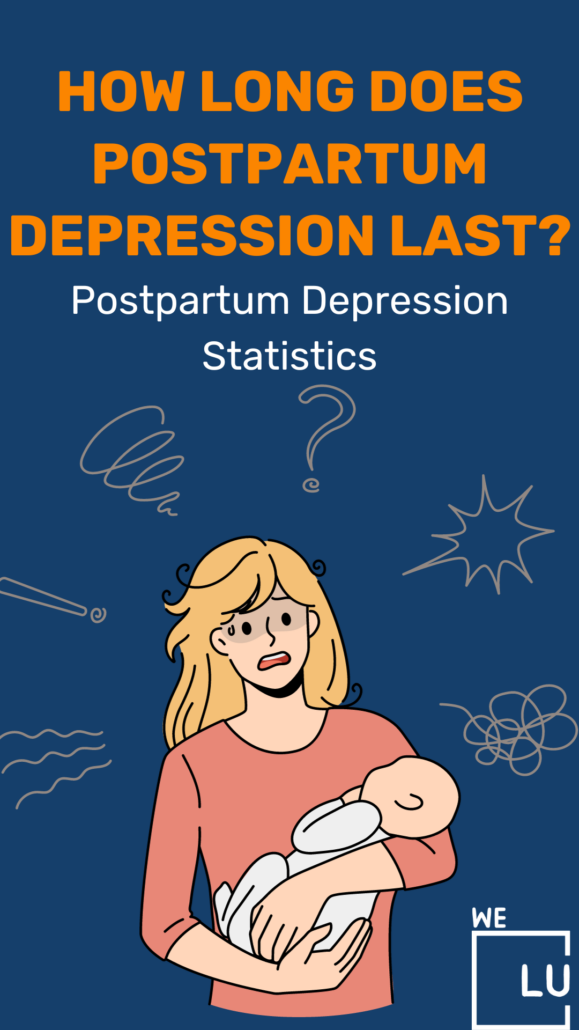How Long Does Postpartum Depression Last?
Postpartum depression is a serious mental health condition that affects some women after childbirth. One of the common questions that arise is, “How long does postpartum depression last?” While the duration can vary from person to person, postpartum depression typically lasts for several weeks to a few months.
However, some women may experience symptoms for longer, extending up to a year or more if left untreated. Recognizing the signs, seeking help, and implementing appropriate treatment are critical steps toward recovery. Understanding the timeline of postpartum depression is crucial in supporting and empowering affected mothers on their path to wellness.
Postpartum depression often begins within the first few weeks after giving birth. It typically peaks around the fourth or fifth week and can last several weeks or months if left untreated. However, it’s important to note that some women may experience symptoms for longer, up to a year or more.
The first few weeks following childbirth, often called the postpartum period, are characterized by numerous physical and hormonal changes, sleep deprivation, and the adjustment to the demands of caring for a newborn. It is during this time that postpartum depression can manifest. The initial symptoms may include persistent sadness, excessive crying, irritability, anxiety, changes in appetite, difficulty sleeping, loss of interest in activities, and a sense of overwhelming fatigue.
In many cases, postpartum depression resolves with time and appropriate treatment. With the support of loved ones, healthcare professionals, and interventions such as therapy, medication, or a combination of both, women can experience significant improvement in their symptoms. However, seeking help as early as possible is crucial to prevent the condition from worsening and potentially leading to long-term consequences.
While postpartum depression often dissipates within the first few months, a subset of women experiences a more prolonged form of postpartum major depression. This condition persists for an extended period, sometimes up to a year or longer, and may require more intensive and comprehensive treatment.
Another related condition known as postpartum psychosis, although rare, can have a more sudden onset and severe symptoms. This condition requires immediate medical attention, as it can pose serious risks to the mother and the baby.
Every woman’s experience with postpartum depression is unique, and the duration can be influenced by various factors such as the severity of symptoms, personal circumstances, access to support systems, and the effectiveness of treatment. It’s crucial to remember that seeking help is not a sign of weakness but a courageous step towards better mental health.

Skip To:
Learn More:
- Is Depression Genetic or Environmental?
- Does Vitamin D Help With Depression? What You Need To Know
- 30 Songs About Depression To Help You Feel Less Alone
- Is Depression a Disability? Eligibility, Applying
- 20 Depression Memes That Will Make You Feel Less Alone
- Relationship Depression, Symptoms, Causes and What To Do
- Depression Art: The Link Between Depression And Creativity
- Short-Term Disability Mental Health
Get Help. Get Better. Get Your Life Back.
Searching for Accredited Dual Diagnosis Mental Health Centers Near You?
Even if therapy failed previously, or are in the middle of a difficult crisis, we stand ready to support you. Our trusted behavioral health specialists will not give up on you. When you feel ready or just want someone to speak to about counseling alternatives to change your life call us. Even if we cannot assist you, we will lead you to wherever you can get support. There is no obligation. Call our hotline today.
FREE 24/7 Dual Diagnosis Mental Health Services HotlinePostpartum Depression We Level Up FL Mental Health Center Tip
Don’t hesitate to lean on your support system, including friends and family, for assistance and understanding. Prioritize self-care, ensuring adequate rest, proper nutrition, and some personal time for relaxation. Remember, postpartum depression is a common and treatable condition, and reaching out for help is a sign of strength, not weakness.
Depression Fact Sheet
Depression Overview
Depression is a group of illnesses like depression or bipolar disorder connected to mood elevation or depression.
Types of Depression
Clinical Depression: A mental health disorder characterized by persistently depressed mood or loss of interest in activities, causing significant impairment in daily life.
Persistent depressive disorder: A mild but long-term form of depression.
Bipolar disorder: A disorder associated with episodes of mood swings ranging from depressive lows to manic highs.
Bipolar II disorder: A type of bipolar disorder characterized by depressive and hypomanic episodes.
Postpartum depression: Depression that occurs after childbirth.
Depression Treatments
- Support group: A place where those pursuing the same disease or objective, such as weight loss or depression, can receive counseling and exchange experiences.
- Cognitive behavioral therapy: A conversation treatment that aims to change the negative attitudes, actions, and feelings connected to psychiatric discomfort.
- Counseling psychology: A subfield of psychology that handles issues with the self that are connected to work, school, family, and social life.
- Anger management: To reduce destructive emotional outbursts, practice mindfulness, coping skills, and trigger avoidance.
- Psychoeducation: Mental health education that also helps individuals feel supported, validated, and empowered
- Family therapy: psychological counseling that improves family communication and conflict resolution.
How Long Does Postpartum Depression Last? Depression Statistics
One of the most prevalent mental diseases in the US is major depression. Some people with serious depression may experience substantial impairments that impede or restrict their capacity to engage in important life activities.
21 million
An estimated 21.0 million adults in the United States had at least one major depressive episode. This number represented 8.4% of all U.S. adults.
Source: National Institute on Mental Health
10.5%
The prevalence of major depressive episodes was higher among adult females (10.5%) than males (6.2%).
Source: National Institute on Mental Health
17.0%
The prevalence of adults with a major depressive episode was highest among individuals aged 18-25 (17.0%).
Source: National Institute of Mental Health